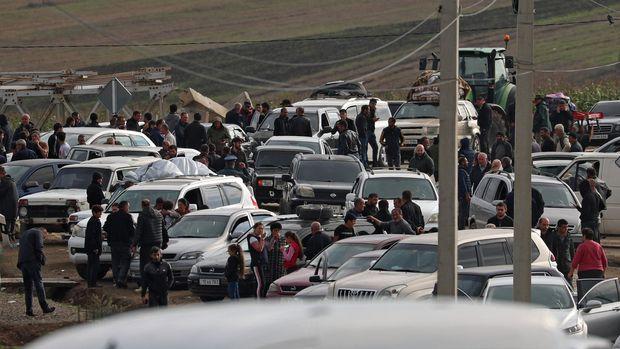What to expect from Russia’s withdrawal from Karabakh? Looking for new horizons
On April 17, Azerbaijani and Russian state media confirmed the reports regarding the Russian peacekeeping mission's withdrawal from the Karabakh region ahead of 2025 after maintaining a presence in the region for four years. The surprise decision of Moscow to withdraw its forces from Azerbaijani soil renewed debates regarding the limitation of Russian peacekeeping missions following the Second Karabakh War in 2020 and the September operation in 2023. According to the Russia-brokered November truce between Azerbaijan and Armenia, a Russian peacekeeping mission deployed on the Lachin road to protect the move of Armenian civilians to and from Karabakh and prevent further armed escalation in the region, albeit unsuccessfully.
In the first stage, the deployment of Russians in Karabakh boosted the optimism of the ethnic Armenian community while frustrating Azerbaijani society. The rapid deployment of nearly 2,000 Russian troops in Karabakh came with a bunch of scepticism in Azerbaijan regarding Moscow's hidden interests. However, the Russian peacekeeping mission's activities in the region triggered criticism on both sides that reached the peak point in September 2023, when Azerbaijan regained full control over the Karabakh region and dismissed the de-facto separatist regime.

Following the military victory, 100.000 ethnic Armenian population left the region, while the former leaders of the separatist regime were detained. Prior to the September operation, Azerbaijan took a very cautious stance on the Russian mission, criticizing it for not disarming the Armenian armed groups and turning a blind eye to occasional fire exchanges, resulting in several human casualties.
Nevertheless, Azerbaijan did not seem in a rush to pull the Russian troops out of its soil, thus generating debates at home and abroad about whether Russia will leave the region by 2025 or extend the mission's term. In addition, Azerbaijani officials and state media regularly emphasized the fact that Russian troops will leave Karabakh by 2025 as after September 2023, the main reason for the presence of Russian forces quickly "disappeared." As such, the new realities on the ground likely became the main point of negotiations between Moscow and Baku that resulted in Russia's withdrawal.

Indeed, the negotiations behind the scenes left additional questions as to why Russia agreed to leave a year before the expiration of the November agreement. In light of the ongoing complex geopolitical situation in the Eurasian continent, there could be several explanations for Moscow's decision. First, Russia mobilizes its additional troops deployed in different regions in an effort to strengthen its hand in Ukraine amid reports that Moscow is preparing for a counter-offensive this summer. Therefore, an additional 2,000 personnel and more than 300 armoured vehicles could be a valuable contribution. Moreover, maintaining additional troops abroad requires additional financial means, which Russia is unlikely to afford now.
In addition to technical and financial reasons, Russia may need additional personnel for its overseas ambitions. Recently, Russia established a strong footprint, placing the continent at the crux of the growing geopolitical contest between the United States and Russia. On the economic side, Russia’s interest in the continent’s vast resources will have repercussions for important supply chains. Recently, Russia established a military presence in Burkina Faso upon the request of the local government to train its military staff. The move came shortly after the Burkina Faso government expelled the French military.

In addition to Burkina Faso, Niger, another African country in the Sahel, invited Russian troops on April 12 to train the local military. The arrival of Russian forces makes it complicated for the US forces, along with diplomatic and civilian personnel, to remain in the country and throws into doubt the future of joint Niger-US counterinsurgency operations.
In this context, the Russian troops leaving Karabakh may end up in Africa to support Russia's presence in a more volatile region, thus becoming more functional in combat zones. Notwithstanding, Russia may leave its sappers in Karabakh to support the ongoing de-mining process as Azerbaijan needs additional support to neutralize the explosives from the region fully.








